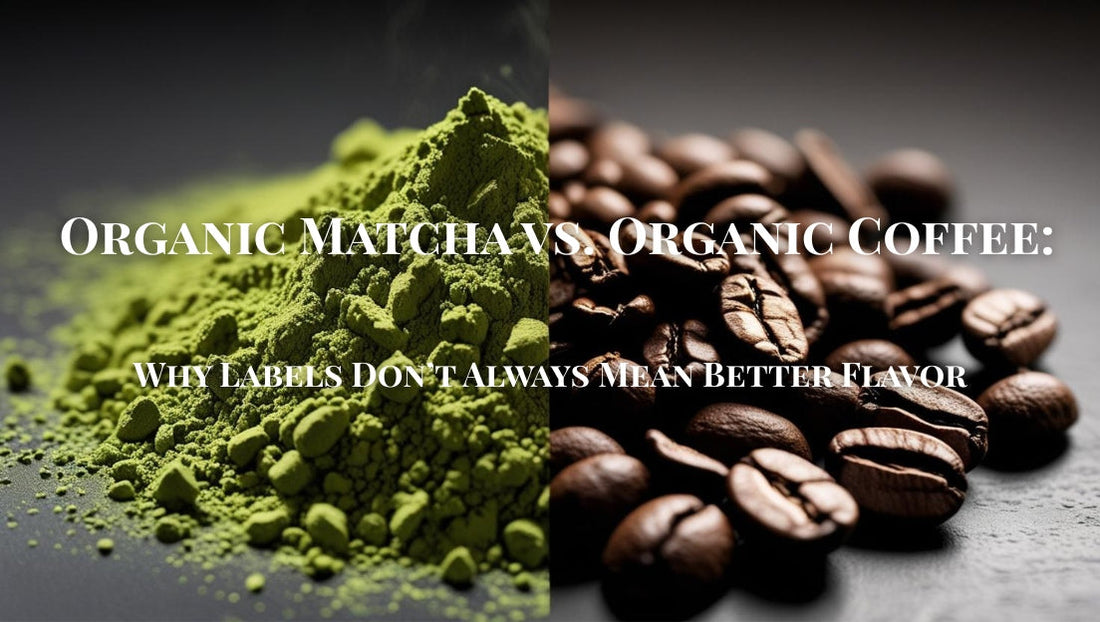
Organic Matcha: Why the Best Matcha Isn’t Always Organic
Share
Intro
When most people see the words organic matcha or organic coffee, they immediately assume “better for health, better for the planet, and probably better tasting.” The idea is powerful: no chemicals, no pesticides, only natural goodness.
But in reality, both the Japanese tea world and the global coffee industry show a very different picture. The best matcha and the most celebrated specialty coffees are often not organic . And the reason lies in how modern certification systems collide with traditional, flavor-driven farming.
What “Organic Matcha” Really Means
In Japan, getting certified as organic matcha is not just about how you grow the tea leaves. The entire chain has to meet strict organic standards:
The tea field (no synthetic fertilizers or pesticides for at least three years).
The aracha factory (first processing of tea leaves).
The refining plant (sorting and blending).
The stone-mill workshop (grinding into powder).
The packaging facility.
If even one step is not certified, the final product cannot legally be sold as organic matcha.
This structure fits big tea estates and industrial-scale companies. But it excludes the small farmers and stone-mill workshops that actually make Japan’s best matcha.

Why Small Farmers Don’t Fit the Organic System
Most Japanese tea farmers own just a few acres. They often run family plots that have been managed for generations. For them, organic certification is nearly impossible:
High costs : yearly inspections, paperwork, testing.
Small scale : yields are too low to justify certification fees.
No clear return : the Japanese domestic market does not pay much more for organic tea.
Even if the farm qualifies, the stone-mill workshop is the real bottleneck. Traditional mills cannot simply set up a separate “organic-only” line — they would need new facilities, separate storage, and new certifications. For a family business with thirty granite mills in one room, this is unthinkable.
The result: even if the tea is grown naturally, the finished product cannot carry the organic matcha label.

The Flavor Problem of Organic Matcha
Flavor is another key reason why organic matcha is rare.
The hallmark of high-grade ceremonial matcha is umami — the rich, savory sweetness created by high levels of amino acids (especially L-theanine). To achieve this, farmers shade the tea plants for weeks before harvest and apply nitrogen precisely to help the leaves accumulate these compounds.
Organic fertilizers release nitrogen slowly and unpredictably. This makes it very difficult to reach the same amino acid levels under Japan’s short shading period. The outcome is often a lighter, more bitter tea — fine for drinking, but not the thick, velvety matcha used in traditional tea ceremonies.
So while organic matcha may sound appealing, it usually does not meet the flavor expectations of high-end tea lovers.
The Coffee Parallel: Why Organic Coffee Isn’t Common in Specialty
Coffee faces the exact same issue.
Organic Certification in Coffee
To sell coffee as organic coffee, the farm, washing station, dry mill, exporter, and roaster all need organic certification. The chain must be unbroken, just like in matcha.
Large cooperatives or estates can manage this, but for small farmers in Ethiopia, Yemen, or Colombia, it’s unrealistic. They may farm naturally, without pesticides or fertilizers, but they cannot afford the paperwork and inspections.
Market Reality
Organic coffee : More common in supermarkets (Whole Foods, Trader Joe’s). It fits the health-conscious mainstream shopper.
Specialty coffee : Focused on altitude, varietal, processing method, and cupping score. Coffee professionals care more about flavor notes like “jasmine, bergamot, peach” than about an organic sticker.
Flavor Impact
Organic fertilizers also release nutrients more slowly in coffee. That can reduce bean density and affect flavor complexity. For farms chasing 87+ point specialty scores, precision nutrition is more important than a certification label.
So in both industries, organic labels do not guarantee the best taste.
Tradition vs. Modern Certification
The deeper issue is that modern organic standards are industrial systems , designed for large farms and global supply chains.
But the best matcha and the best coffee come from smallholder farms, traditional methods, and artisanal processing .
In Shizuoka, Japan, the Chagusaba system uses cut grass to enrich tea fields, improving soil and flavor. It’s a UNESCO-recognized heritage farming method, deeply sustainable — yet not automatically “organic.”
In Ethiopia, many coffee farmers intercrop with native forest plants, essentially practicing “organic by default” agriculture — but without certification.
Both cases show the same truth: tradition and craftsmanship are the real standards of quality, not industrial labels.

What Consumers Should Know
If you are choosing between organic matcha and non-organic, or between organic coffee and specialty coffee, here are the key points:
-
Safety is Guaranteed
Both matcha and coffee must pass strict residue tests before export. Non-organic does not mean unsafe.
-
Flavor Is Not About Labels
The richest matcha comes from shaded fields and stone mills. The most complex coffee comes from precise fermentation and careful roasting. Neither depends on “organic” certification.
-
Small Farms Are the True Source of Quality
Many of the best teas and coffees come from family-run plots too small to afford certification, but their quality often surpasses industrial organic products.
-
Organic Matcha and Organic Coffee Are Market Labels
These labels help in health-focused retail channels, but they are not the defining measure of quality in the world of tea or coffee.
Conclusion: Beyond the Organic Sticker
Organic matcha and organic coffee are valuable categories, especially for health-conscious consumers. But the real story is that the most flavorful, most traditional, and most authentic products often live outside these labels.
Just as coffee professionals trust a farm’s varietal and processing more than a certification, tea lovers know that matcha’s excellence comes from shading, amino acids, and stone milling.
So when you pick your next tin of matcha or bag of coffee, remember: labels are modern standards, but flavor comes from tradition.
Ready to taste matcha beyond the label?
Explore our ceremonial matcha collection , stone-milled in Japan and crafted for true umami.

Aileen Gong is a food creator, sommelier, and graduate of the School of the Art Institute of Chicago.
She shares quiet, beautiful recipes that celebrate simple rituals and mindful flavors.
She grows blueberries in pots, hand-whisks her matcha, and believes every drink can be a small moment of peace.
1. What is organic matcha?
Organic matcha is powdered green tea made from leaves grown without synthetic fertilizers or pesticides, processed and packaged only in certified organic facilities. To legally use the label, every step of the chain — from tea field to stone-milling to packaging — must be certified.
2. Does organic matcha have caffeine?
Yes. Organic matcha has the same natural caffeine as non-organic matcha, usually around 30–40mg per gram. A typical bowl contains roughly half the caffeine of a cup of coffee, but with more L-theanine, which balances energy with calm focus.
3. What is the difference between organic ceremonial grade matcha and regular organic matcha?
Organic ceremonial grade matcha is made from the youngest leaves, shaded for weeks to increase sweetness and umami. Regular organic matcha powder may use older leaves, making it better for lattes or baking. The challenge is that organic fertilizers release nutrients slowly, so even ceremonial organic matcha can taste lighter than non-organic ceremonial teas.
4. Where to buy organic matcha powder?
You can find organic matcha powder in health stores, on Amazon, and in specialty tea shops. If you care about flavor, look for products from Japan labeled as ceremonial grade, not just “organic.” For high quality organic matcha green tea powder, choose sellers who publish lab test results and explain their sourcing.
5. What is organic matcha green tea powder used for?
Organic matcha green tea powder is versatile. It can be whisked into traditional tea, blended into lattes, added to smoothies, or baked into desserts. For drinking straight, ceremonial grade is best. For cooking, a lower grade is fine.
